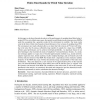1147 search results - page 21 / 230 » Statistical Timing Analysis Using Bounds |
125
click to vote
JMLR
2008
15 years 2 months ago
2008
In this paper we develop a theoretical analysis of the performance of sampling-based fitted value iteration (FVI) to solve infinite state-space, discounted-reward Markovian decisi...
143
click to vote
DDECS
2006
IEEE
15 years 6 months ago
2006
IEEE
Abstract-- Hard real-time systems need methods to determine upper bounds for their execution times, usually called worst-case execution times. Timing anomalies are counterintuitive...
108
click to vote
ESOP
2010
Springer
15 years 11 months ago
2010
Springer
In 2003, Hofmann and Jost introduced a type system that uses a potential-based amortized analysis to infer bounds on the resource consumption of (first-order) functional programs. ...
131
click to vote
INFOCOM
2009
IEEE
15 years 9 months ago
2009
IEEE
—The ability to scalably measure one-way packet loss across different network paths is vital to IP network management. However, the effectiveness of active-measurement techniques...
108
click to vote
WCET
2008
15 years 3 months ago
2008
Conditional branches connect the values of program variables with the execution paths and thus with the execution times, including the worstcase execution time (WCET). Flow analys...

